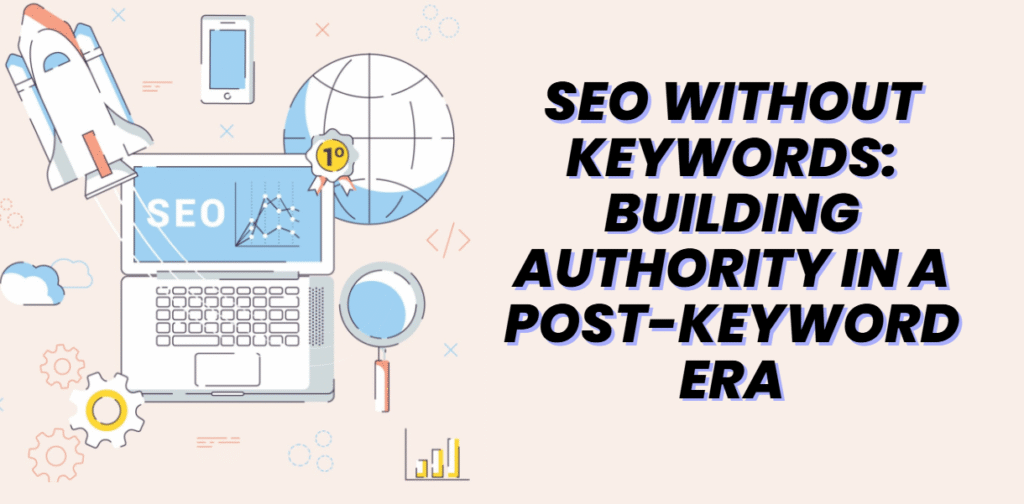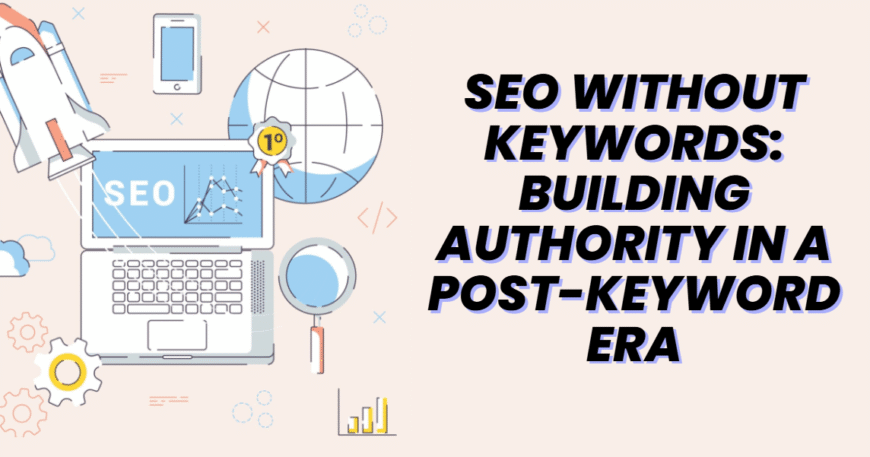
Table of Contents
- Introduction: The Evolution of SEO
- Why Keywords Aren’t Everything Anymore
- What Does Authority Mean in SEO Today?
- Building Topical Authority through Content Depth
- The Role of User Intent and Experience
- Leveraging E-E-A-T for Long-Term Visibility
- Embracing Semantic Search and Context
- Creating an SEO Strategy Beyond Keywords
- Conclusion: Future-Proofing Your SEO Strategy
- FAQs
1. Introduction: The Evolution of SEO
Search Engine Optimization (SEO) has long been synonymous with keywords—those specific terms and phrases users type into search engines. In earlier days, ranking well often meant stuffing your content with the right mix of keywords. However, the SEO landscape has evolved dramatically. With advancements in natural language processing, AI, and Google’s algorithms like BERT and RankBrain, search engines now understand meaning, context, and user intent far better than before.
As a result, success in SEO is no longer just about matching search terms but about providing real value and authoritative content. This shift marks the beginning of a post-keyword era where authority, trustworthiness, and user satisfaction take precedence over mere keyword density.
2. Why Keywords Aren’t Everything Anymore
While keywords still have their place in the SEO toolkit, they are no longer the linchpin they once were. Search engines now assess how well a piece of content addresses a topic comprehensively rather than how many times a keyword appears. Google’s updates aim to reward helpful content, not robotic keyword-stuffed articles.
Keyword variations, natural language, and topic clusters matter more because they align with how people actually search and think. This means content that ranks well today must deliver substance, answer questions thoroughly, and reflect an in-depth understanding of the subject. The game has shifted from tricks to trust, from keywords to knowledge.
3. What Does Authority Mean in SEO Today?
In today’s SEO environment, authority is built through consistent, accurate, and valuable content that resonates with your target audience. It’s not just about having a high domain rating or lots of backlinks. True authority means being recognized as a reliable source of information within a specific niche. This recognition comes from creating content that demonstrates expertise, gets cited by others, and generates meaningful user engagement.
Google now rewards domains and pages that exhibit experience, expertise, authoritativeness, and trustworthiness (E-E-A-T). In other words, being an authority isn’t a technical trick—it’s a long-term strategy rooted in quality, credibility, and relevance.
4. Building Topical Authority through Content Depth
To thrive in the post-keyword SEO world, brands and creators must focus on topical authority—that is, covering a subject area comprehensively rather than superficially. Instead of writing scattered articles across various topics, build clusters of content that delve deeply into your core niche. For example, if your site focuses on fitness, don’t just write one article on “HIIT workouts.”
Create a series of interconnected posts that explore HIIT routines, benefits, risks, nutrition, and recovery. This depth signals to search engines that you are a go-to resource for that topic. Internal linking among these related pieces further strengthens your credibility in Google’s eyes.
5. The Role of User Intent and Experience
Understanding user intent is crucial when building content today. SEO without keywords doesn’t mean creating content blindly—it means focusing on what users actually want when they land on your site. Are they looking for a quick answer, a how-to guide, or an in-depth analysis? Your content must align with that need.
User experience also plays a critical role: how easily can someone navigate your site, find information, and engage with it? Bounce rate, time on page, mobile optimization, and page speed are all factors that influence how Google perceives the value of your content. Ultimately, satisfying users is the new cornerstone of SEO.
6. Leveraging E-E-A-T for Long-Term Visibility
Google’s emphasis on Experience, Expertise, Authoritativeness, and Trustworthiness (E-E-A-T) reflects its commitment to high-quality content. In this new landscape, simply optimizing for keywords won’t cut it. You need to show that your content is written or reviewed by people with relevant credentials or lived experience. Add author bios, cite reputable sources, and regularly update outdated content.
Trust is also built through transparency, such as having clear contact information and a privacy policy. The more credible your site appears, the more likely it is to rank well—even without aggressive keyword usage. E-E-A-T isn’t a checklist; it’s a mindset.

7. Embracing Semantic Search and Context
Google no longer reads content in isolation—it evaluates the semantic meaning behind your words. Semantic search looks at the relationships between words, the context in which they’re used, and how well they match a user’s intent. For example, someone searching for “apple” might mean the fruit or the tech company. Your job is to create content that makes context clear and valuable. Use structured data, topic modeling, and natural language that mirrors how people speak and write. Tools like NLP and Google’s Knowledge Graph assist in this. The future of SEO lies in meaning, not just matching.
8. Creating an SEO Strategy Beyond Keywords
An effective modern SEO strategy involves more than keyword research. Start by mapping out user journeys and identifying the questions your audience has at each stage. Build content pillars that address those needs comprehensively, and interlink related pages to strengthen topical authority. Invest in high-quality visuals, multimedia, and accessible design to improve engagement.
Monitor performance with analytics tools, but go beyond just traffic—look at behavior, conversions, and feedback. Focus on brand authority, thought leadership, and relationship building through content. SEO today is holistic. It’s about creating an ecosystem that serves, informs, and earns trust over time.
9. Conclusion: Future-Proofing Your SEO Strategy
As search engines grow more intelligent, chasing keywords is no longer enough. The post-keyword era demands authenticity, depth, and authority. By prioritizing user intent, building topic expertise, and investing in E-E-A-T principles, brands can future-proof their visibility.
The focus must shift from hacks to holistic strategies that emphasize content quality, structure, and usefulness. If you’re still optimizing for search engines instead of real people, it’s time to pivot. True SEO success today comes from being the most reliable, helpful, and credible voice in your field—not from gaming an algorithm.
Frequently Asked Questions (FAQs)
Q1. Can I ignore keywords completely in modern SEO?
No, but you don’t need to obsess over them. Use keywords naturally and focus more on context, user intent, and content depth.
Q2. What is topical authority and how do I build it?
Topical authority means covering your niche comprehensively. Build it by creating interconnected content that explores all relevant subtopics in detail.
Q3. How important is E-E-A-T for ranking today?
Very important. Google uses E-E-A-T to determine credibility. Showcasing your expertise, providing citations, and being transparent helps boost your rankings.
Q4. Is backlinking still relevant if I’m not using keywords heavily?
Yes. Backlinks from reputable sources still matter as they signal trust and authority, even in a keyword-light SEO strategy.
Q5. How do I optimize for semantic search?
Use natural language, answer real questions, and create structured content. Implement schema markup and context-driven writing to align with semantic search.



